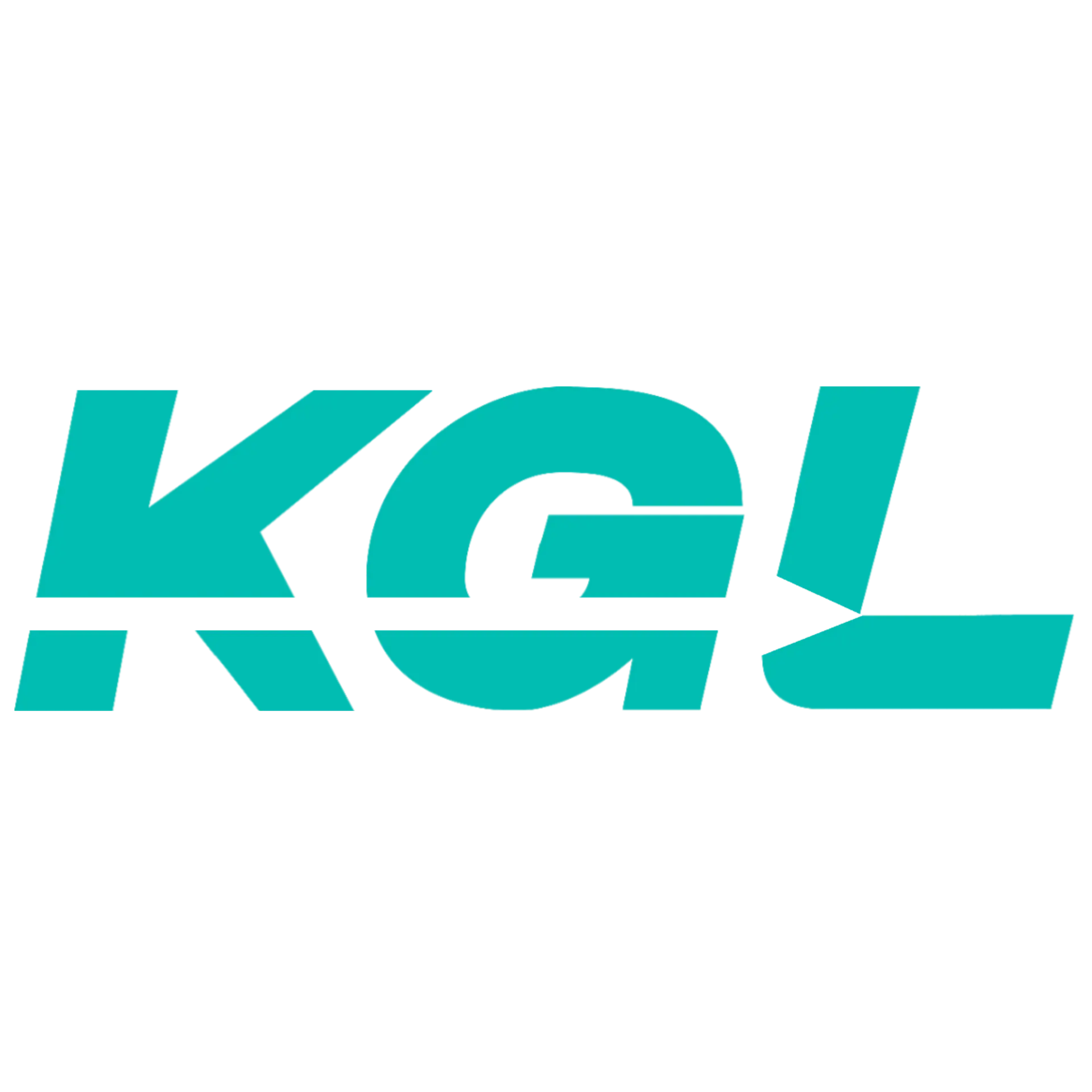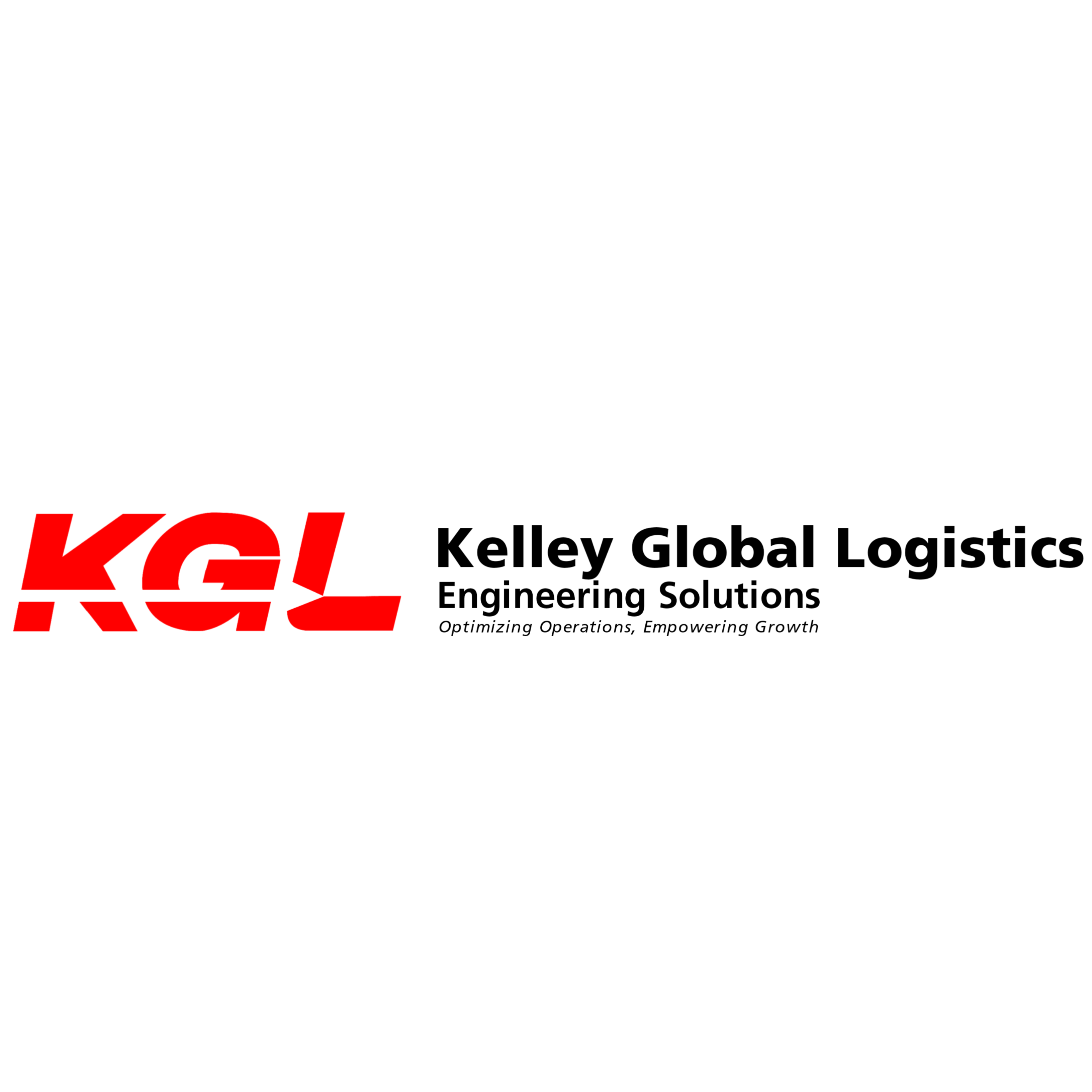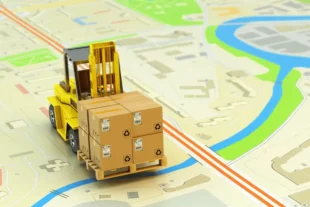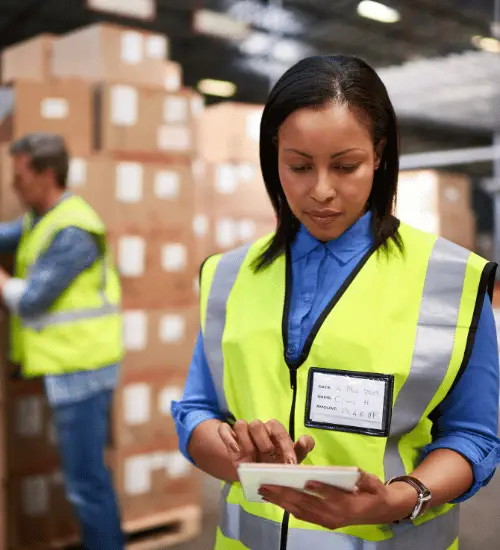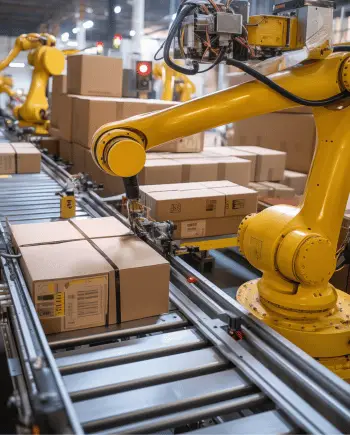Table of Contents
The Future of Logistics is Autonomous!
The logistics industry is undergoing a seismic shift, with autonomous delivery solutions taking center stage. Companies worldwide are racing to integrate artificial intelligence (AI), robotics, and autonomous vehicles into their supply chains, fundamentally transforming how goods move from warehouses to consumers. According to Precedence Research, the global autonomous last-mile delivery market was valued at $1.25 billion in 2024 and is expected to surpass $4.2 billion by 2030, growing at a CAGR of 22.7%.
This rapid adoption is driven by the rising demand for faster, cost-effective, and contactless delivery solutions. McKinsey & Company reports that over 80% of consumers expect same-day or next-day delivery, pushing retailers and logistics providers to seek high-efficiency alternatives. Enter autonomous logistics—where self-driving trucks, drones, and robotic couriers take over traditional delivery systems to reduce costs and improve efficiency.
According to Michael Baker, a senior analyst at Gartner:
“Autonomous logistics is not just about reducing labor costs; it’s about optimizing routes, reducing emissions, and increasing overall supply chain resilience.”
Companies leading the charge in this space are developing cutting-edge technologies to address the challenges of urban congestion, sustainability, and delivery speed.
Autonomous delivery robots are also cheaper than human-staffed delivery services. For instance, Starship earlier claimed that its delivery robot cost US$5,500, and hoped to reduce to $2,250.
From Nuro’s AI-powered delivery pods to Amazon’s Prime Air drones, the landscape of autonomous delivery is more competitive than ever. This article highlights the top 7 leading autonomous delivery companies in 2025, exploring their technologies, market impact, and what sets them apart in this fast-evolving industry.
Leading Autonomous Delivery Companies Powering Autonomous Logistics
1. Nuro
Nuro is a pioneer in autonomous delivery vehicles, focusing on last-mile logistics for groceries, pharmaceuticals, and retail goods. Unlike self-driving passenger cars, Nuro’s R2 and R3 models are designed without human occupants, maximizing cargo space and operational efficiency. These vehicles utilize a combination of:
- LiDAR, radar, and high-definition cameras for precise object detection and navigation.
- Machine learning algorithms to predict pedestrian and vehicle behavior.
- Electric powertrains for zero-emission, sustainable deliveries.
The Nuro R2, approved by the U.S. Department of Transportation in 2020, was the first autonomous vehicle to operate on public roads without traditional driving controls (steering wheel or pedals). In 2023, Nuro unveiled the R3 model, featuring modular cargo compartments and an improved AI system for enhanced delivery efficiency.
Nuro has established high-profile partnerships with industry leaders to accelerate the deployment of autonomous logistics solutions. Nuro has formed partnerships with major retailers like Kroger and a 10-year collaboration with Uber, delivering for Uber Eats in select cities. Other partners include Domino’s, FedEx, 7-Eleven, etc.
Nuro is also partnering with automotive OEMs and mobility platforms to accelerate the widespread adoption of AI-first autonomous vehicles. Nuro’s licensing model offers automotive OEMs and mobility companies access to a commercially independent, road-proven platform, accelerating their autonomous vehicle development and deployment timelines.
With over 2 million autonomous miles driven, Nuro continues to lead the autonomous logistics revolution.
2. Starship Technologies
Starship Technologies, founded in 2014 by Skype co-founders Janus Friis and Ahti Heinla, is an Estonian company specializing in autonomous delivery vehicles designed for last-mile delivery. Headquartered in San Francisco, California, with engineering operations in Tallinn, Estonia, and Helsinki, Finland, Starship also maintains offices in London and Milton Keynes in the United Kingdom, as well as Hamburg, Germany. The company aims to revolutionize last-mile delivery, making it more affordable, sustainable, and efficient.
Starship Technologies develops and operates electrically-powered last-mile delivery robots. These robots navigate sidewalks at a maximum speed of 3.7 mph (6 km/h), using feature detection and mapping techniques to assess terrain suitability. Each robot weighs 55 pounds (25 kg) unloaded and can carry up to 20 pounds (9.1 kg) of deliveries.
Equipped with a sensor suite including ten stereo and time-of-flight cameras, GPS, ultrasonic sensors, radar, and inertial measurement, the robots can operate autonomously, with remote control available if needed. The robots also feature loudspeakers for communication, offering various voices and the ability to play music. Starship’s robots are 99% autonomous, using radars, cameras, sensors, and machine learning to identify objects and navigate their surroundings.
Starship robots are deployed at over 30 U.S. universities, including Arizona State University and George Mason University, providing students with autonomous food and package delivery. The company has also launched commercial services in Milton Keynes, UK, delivering groceries via its mobile app. Other partners include Uber Eats, manning robotic food deliveries in Los Angeles and Fairfax, Virginia.
With a fleet of over 2,000 robots in operation globally, Starship Technologies is revolutionizing urban and campus deliveries. Its autonomous robots are not only reducing delivery costs and emissions but also proving that small-scale autonomy can have a massive impact on global logistics.
3. Kiwibot (Kiwi Campus)
Kiwibot is a trailblazer in autonomous sidewalk delivery, using AI-powered robotic couriers to facilitate affordable and sustainable last-mile deliveries. The company specializes in compact, four-wheeled delivery robots, designed for urban environments and college campuses.
Kiwibot develops autonomous robots using artificial intelligence. Their robots are equipped with six cameras and binocular vision for navigation and hazard avoidance. The robots use AI and machine learning, including deep learning, to autonomously modify their speed on sidewalks depending on the proximity of people. Human operators at the company’s center monitor their progress and can take control when needed, such as when crossing streets. Kiwibot also offers the Kiwibot Cargo, which can handle up to 80 liters or 33 lbs, with configurable compartments and shelves.
In April 2024, Kiwibot acquired AUTO Mobility Solutions, a Taipei-based company specializing in chip manufacturing for AI, self-driving vehicles, robotics, the Internet of Things (IoT), and cybersecurity.
Kiwibot has also established partnerships with major retailers and food delivery companies including Walmart, Grubhub, etc. They have received funding from the likes of PayPal to enhance its AI capabilities and support global expansion.
Each robot is 100% electric, producing zero emissions, making it an environmentally friendly solution for urban logistics.
4. Clevon
Clevon, established in 2022 and headquartered in Estonia, specializes in developing and manufacturing autonomous robot carriers for the logistics and transportation sector. The company is making waves in the autonomous logistics industry with its innovative autonomous delivery vehicles (ADVs). Unlike smaller sidewalk delivery robots, Clevon’s CLEVON 1 is a multi-compartment, on-road electric vehicle designed for parcel, grocery, and food delivery services.
CLEVON 1robots feature Level 4 autonomy, optimized for controlled environments within a defined Operational Design Domain (ODD), such as mapped urban areas and industrial zones. A single operator can monitor and manage multiple vehicles simultaneously, reducing labor costs by 80-90%. These lightweight electric robots are compatible with power grids, helping companies to achieve their carbon emission targets and increase efficiency.
CLEVON 1 can carry multiple orders in different compartments, reducing the need for repeated trips.
Clevon has established partnerships with major players in retail, grocery, and logistics, including DPD, DHL Express Estonia, Colruyt Group, and IKI. Clevon expanded its global operations to North America and opened its Center of Excellence and U.S. headquarters in the Dallas-Fort Worth Metroplex at the AllianceTexas Mobility Innovation Zone. It also collaborated with T-Mobile to keep its robot fleet connected and running smoothly.
5. Serve Robotics
Serve Robotics, a spin-off from Uber, is at the forefront of autonomous sidewalk delivery, specializing in zero-emission, AI-driven robots designed for urban environments. Unlike full-sized autonomous vehicles, Serve’s robots are compact, pedestrian-friendly, and built to navigate sidewalks with ease.
Their self-driving robots have successfully completed tens of thousands of contactless deliveries in Los Angeles and San Francisco. The company’s robots use digital lidar to perceive their environment, identify their precise location, and safely navigate alongside pedestrians. Serve Robotics is expanding its lidar supply agreement with Ouster to equip its next-generation robots with upgraded sensors for enhanced performance.
Serve Robotics is backed by Uber and NVIDIA. They have a commercial agreement to deploy up to 2,000 robots with Uber Eats. Koreatown residents ordering on Uber Eats may have their orders fulfilled by a Serve delivery robot. The company’s strategic partners, Uber and NVIDIA, continue to support Serve as they work to bring sustainable, autonomous delivery to every doorstep.
You May Also Like:
Top 7 Leading Autonomous Delivery Companies (2025)
6. Udelv
Udelv is a trailblazer in autonomous middle-mile delivery, focusing on business-to-business (B2B) logistics rather than last-mile consumer deliveries. Its flagship vehicle, the Transporter, is a fully electric, self-driving delivery van designed to revolutionize supply chains by automating longer-distance urban and suburban deliveries.
As the first company to create cab-less electric autonomous delivery vehicles dedicated to multi-stop delivery, Udelv aims to tackle the challenges of driver shortages and fleet electrification.
Udelv’s primary offering is the Transporter, a cab-less autonomous electric delivery vehicle. Key features include:
- uPod: A proprietary, self-contained, hot-swappable modular cargo pod capable of carrying up to 2,000 lbs of goods.
- Multi-Stop Delivery: Can make up to 80 stops per cycle.
- Range: Offers ranges between 160 and 300 miles per run, depending on the battery pack option. Fast charging for 45 minutes can add up to 220 miles of range.
- Mobileye Drive self-driving system: Incorporates the fifth generation of EyeQ, Mobileye’s System-on-Chip for automotive applications. It uses Road Experience Management (REM), a continuously updated map for autonomous navigation.
- Teleoperation System: A 24/7 proprietary ultra-low latency camera-based teleoperation system for remote maneuvers and assistance.
- uECU: Udelv’s proprietary uECU (Electronic Control Unit) acts as the vehicle’s central compute unit to integrate and optimize all functions
Udelv has garnered more than 1,000 reservations, including from USA-based Donlen and Europe-based Planzer and Ziegler Group. The company was also awarded a contract from the US Air Force for a pilot program at Edwards Air Force Base in California. Udelv has partnered with XL Parts, a leading automotive aftermarket parts distributor in Texas, for autonomous last-mile delivery. Ziegler Group has also ordered autonomous and electric delivery vehicles from Udelv.
7. Amazon Prime Air
Amazon Prime Air is a drone delivery service aiming to deliver packages to customers in 30 minutes or less using autonomous aerial vehicles. Launched in 2022, it currently operates in College Station, Texas, and West Valley Phoenix, Arizona. Amazon is working to expand the service to the United Kingdom and Italy. The initiative enhances Amazon’s existing services by optimizing the delivery of lightweight items over short distances. Amazon received an Air Carrier Certificate from the FAA in 2020, allowing it to operate as an airline and deliver small packages via drone.
Prime Air is developing breakthrough drone technology to make package delivery faster, quieter, and easier. Their newest drone, the MK30, can fly twice as far as previous models and operate in more diverse weather conditions. It also features sense-and-avoid technology to identify and avoid obstacles.
Amazon aims to deliver 500 million packages per year via drone by the end of the decade. Drone deliveries will integrate into Amazon’s delivery network, deploying from facilities next to Same-Day Delivery sites.
Conclusion
The autonomous logistics industry is at an inflection point, with rapid advancements in artificial intelligence, robotics, and sensor technology revolutionizing supply chain operations. Companies like Nuro and Starship are actively deploying autonomous solutions at scale, reshaping the way goods are transported.
A 2024 McKinsey & Co. report found that 72% of urban consumers prefer same-day delivery options, and autonomous delivery solutions are key to meeting this demand.
Autonomous delivery solutions are proving to be more efficient than human-operated services. Autonomous delivery companies have demonstrated how AI-powered logistics can cut last-mile delivery costs by up to 40% while improving consistency and delivery speed.
The next wave of innovation in autonomous logistics will be driven by AI and machine learning. The race for dominance in this space is far from over, but one thing is certain: Autonomous delivery is here to stay, and it’s only getting started.
You May Also Like:
- Top 7 Emerging Supply Chain Logistics Technologies
- Industry 4.0 in Supply Chains: Here’s How It Works
- Top 10 Global Supply Chain Trends to Watch in 2025
- CES 2025: These Emerging Technologies Will Revolutionize Global Supply Chains


